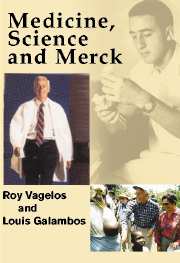Book contents
- Frontmatter
- Contents
- Preface
- 1 The Making of a Physician
- 2 Hot Science in Big Government
- 3 The French Alternative
- 4 The Research University – American Style
- 5 Turning the Corner at Merck
- 6 Crisis
- 7 Blockbusters
- 8 On-the-Job Training
- 9 Global Aspirations
- 10 The Moral Corporation
- 11 Getting to Know the Clintons
- 12 Partners
- Index
3 - The French Alternative
Published online by Cambridge University Press: 30 July 2009
- Frontmatter
- Contents
- Preface
- 1 The Making of a Physician
- 2 Hot Science in Big Government
- 3 The French Alternative
- 4 The Research University – American Style
- 5 Turning the Corner at Merck
- 6 Crisis
- 7 Blockbusters
- 8 On-the-Job Training
- 9 Global Aspirations
- 10 The Moral Corporation
- 11 Getting to Know the Clintons
- 12 Partners
- Index
Summary
We went to France by ship in the summer of 1962 and immediately started looking for an apartment in Paris. Both Diana and I thought we knew enough French to figure out the Parisian real estate market on our own, and besides, we enjoyed feeling self-reliant. Since I had been spoiled by living within walking distance of the NIH laboratory, we concentrated on locations close to the Pasteur Institute. At first we were disturbed to learn that all apartments in Paris had two prices: the official, legal, taxable price, which was very low, and the unofficial, illegal, cash price, which was higher. But even the cash prices were reasonable, and we decided not to buck the system. If French apartment owners wanted to avoid taxes – apparently a national tradition – we would just have to play by their rules.
Once we made that decision, we were surprised at how easily we found just what we wanted: a modest apartment within reach of our very limited budget on the right bank of the River Seine near Montmartre. The location was attractive, close to the great museums and restaurants, and I would be only a short distance from the Institute.
The next day I went to the laboratory to meet Jacques Monod. Knocking, I heard him answer, “Entrez!” Primed to continue practicing my French, I walked into his tiny office and said, “Bonjour, Monsieur.” Monod glanced up and said, “Hi, Roy.” Monod was completely fluent in both languages.
- Type
- Chapter
- Information
- Medicine, Science and Merck , pp. 58 - 73Publisher: Cambridge University PressPrint publication year: 2004



